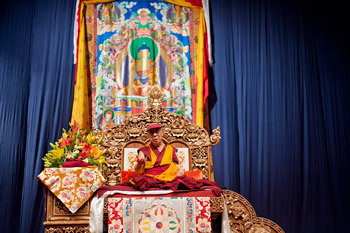
His Holiness the Dalai Lama during his teachings in Milan, Italy, on June 27, 2012. Photo/Tenzin Choejor/OHHDL
His Holiness the Dalai Lama Teachings in Milan
Milan, Italy, 27 June, 2012 – Here in Milan, the commercial and fashion capital of Italy, His Holiness today gave an explanation of Je Tsongkhapa’s small text, Three Principal Aspects of the Path https://www.sangye.it/altro/?p=481 with its succinct summation of the Buddhist path to enlightenment.
Before leaving for the teaching venue he gave a brief interview to Italian broadcaster TG1. Asked how the international community can help Tibet in the current circumstances, His Holiness drew attention to the number of Chinese intellectuals and retired officials who have expressed concern and are critical of Chinese policy in Tibet. Internationally there is interest in Tibet’s ecology and the damage that is being done, concern about the survival of Tibet’s culture of peace and compassion and growing interest in Tibetan Buddhism as one of the most complete presentations of the Buddha’s teachings. At a government level there is a need to consider economic relations with China, but just as Chinese people are showing concern about Tibet, international support is very helpful.To a question about what the world needs, His Holiness responded,
“We need to pay greater attention to inner values. Of course we need material development, but we need to understand that by itself it doesn’t bring peace of mind. This can only be developed within the mind.”
In keeping with his efforts to promote inter-religious harmony, on his way to the Mediolanum Forum, His Holiness made a short pilgrimage to the Milan Cathedral where he was welcomed by Monsignor Luigi Manganini and Monsignor Giordano Ronchi. He paid his respects and spent a moment in silent prayer.
As His Holiness appeared on the stage at the Mediolanum Forum a cheer went up from the 8000 people waiting to hear him. He responded,
“I am very happy to be here with you. As I always say, as human beings we are all the same. We have this marvellous intelligence, which sometimes creates problems for us, but when influenced by warm-heartedness can be very constructive. In this context we need to appreciate the value of having moral principles. We all have the potential for good and bad, but from birth are equipped to develop a warm heart by the affection we receive from our mothers.”
After inviting monks belonging to the Pali tradition to recite the Mangala Sutra His Holiness said he was going to talk about Buddhism and that what differentiates Buddhism from other spiritual traditions is its unique view of selflessness; the notion that a self exists but only as a designation. Our misconception of self is a significan part of our ignorance and we can’t overcome it immediately. We need to apply a gradual process of cultivating wisdom. Even then a mere intellectual understanding of emptiness is insufficient, we need to apply our minds single-pointedly in combination with special insight meditation.
After lunch His Holiness attended a meeting with the Press at which he said how happy he is to interact with them. Recognising the important role of the media, he told them he wanted to inform them about his two prime commitments: to spread awareness of the sources of genuine human happiness and the promotion of inter-religious harmony and understanding. He said that regardless of whether we are religious believers or non-believers we all have the same potential for good or bad which a greater awareness of inner values and secular ethics can temper. Wherever he goes he tries to generate awareness of this and he feels the media have a responsibility in this regard too. He also reiterated his sense that the media should have a long nose to sniff out what’s going on and to report what they discover to the public.
Back in the teaching hall, he turned to the short text by Je Tsongkhapa a great scholar and adept who wrote it as a letter in response to a request for spiritual guidance from one of his close disciples Ngawang Drakpa from Gyalrong. The text belongs to the Stages of the Path tradition that lays out the stages of Buddhist path to enlightenment. The three principal aspects that it deals with are the determination to be free, the altruistic awakening mind and the wisdom that realizes emptiness of intrinsic existence. This last point has to do with the Buddhist contention that things do not exist independently and of their own accord, but due to other factors. Combining a sense of altruism with this understanding can have the effect of loosening the hold of our apparently natural tendency towards self-centredness.
The text ends with the exhortation, “depending on solitude, generate the power of joyous effort and quickly accomplish the final goal, my son.” His Holiness explained,
“When you have the opportunity, for example, early in the morning when the mind is clear, think about what you have heard and read here. Think about the difference between appearance and reality. My own experience is that when I wake at about 3.30 in the morning, I remember the Buddha and think about his teachings on altruism and emptiness. Then I dedicate the actions of my body, speech and mind to accomplishing the welfare of others – Christians and Muslims can apply the same procedure to their own faith. This contributes to my sense of inner peace.”
Tomorrow, early in the morning His Holiness will bestow an Avalokiteshvara empowerment; in the afternoon he will give a public talk on Ethics for a Whole World. In the evening he will embark on his journey back to India.
http://www.dalailama.com/news/post/820-teachings-in-milan